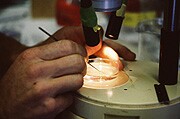

WEDNESDAY, Sept. 9, 2015Hundreds of clinics across the United States are offering unapproved stem cell treatments for conditions from baldness to heart failure and Alzheimer’s disease, researchers report.
“These for-profit stem cell clinics operate outside mainstream regulatory frameworks normally in place to protect patients,” said study lead author Hermes Taylor-Weiner, of the University of California, San Diego, bioengineering department.
“These clinics are selling stem cell treatments that have not been shown to be safe or effective, so they are unproven,” he said.
Stem cells have been touted as miracle cures for a variety of diseases, but the field is not as advanced as the public believes, according to the report in the Sept. 10 issue of the New England Journal of Medicine.
“Patients need to have a healthy dose of skepticism when considering these treatments,” Taylor-Weiner said.
Conservatively, Taylor-Weiner estimates hundreds of clinics perform unapproved stem cell treatments in the United States. In reality, he said, thousands may operate throughout the country.
The U.S. Food and Drug Administration has only approved a few stem cell treatments. The approved procedures utilize cells from bone marrow to treat diseases of the blood or immune system, the report explained.
On the other hand, most of the clinics referred to in the new report use fat cells taken from patients during liposuction, Taylor-Weiner said. The cells are processed, and the stem cells isolated and injected back into the patient. The process is called stromal vascular fraction (SVF).
Adult stem cells have the potential to become almost any type of cell, including heart cells and bone cells, researchers say. The hope of stem cell therapy is that these cells will go where they are needed and repair and replace damaged cells.
But Taylor-Weiner said the SVF cells might travel to parts of the body where they’re not needed and perhaps damage healthy organs.
The report calls for tighter federal regulations.
However, because these clinics use a patient’s own cells, the treatments are considered the practice of medicine and, as such, beyond the FDA’s authority, said Sarah Peddicord, an agency spokeswoman.
“We can only follow the laws that have been created,” she said. “Our oversight of stem cells is to ensure that communicable diseases aren’t transmitted.”
Without FDA approval, the SVF treatments aren’t covered by insurance, so a patient’s costs can run from $5,000 to $50,000, according to the report.
A significant danger, Taylor-Weiner said, is that patients who buy these services may miss out on an opportunity for approved treatment.
“Sometimes patients are convinced to use these treatments instead of a more effective, evidence-based treatment,” he said.
Until these clinics are regulated, it’s really a matter of “buyer beware,” said Dr. David Katz, director of the Yale University Prevention Research Center in New Haven, Conn.
“Stem cell therapies represent tremendous potential for medical advance and offer a legitimate basis for hope in areas where current treatments are woefully inadequate,” Katz said.
However, marketing claims routinely extend well past the limits of science and exploit false hopes, he added.
“Desperation may breed a particular brand of gullibility, so the patients to whom such clinics cater may be especially vulnerable to what sounds, and in fact is, too good to be true,” Katz said.
More information
For more on stem cell therapy, visit the U.S. National Institutes of Health.
Source: HealthDay
Copyright © 2024 HealthDay. All rights reserved.

Leave a Reply